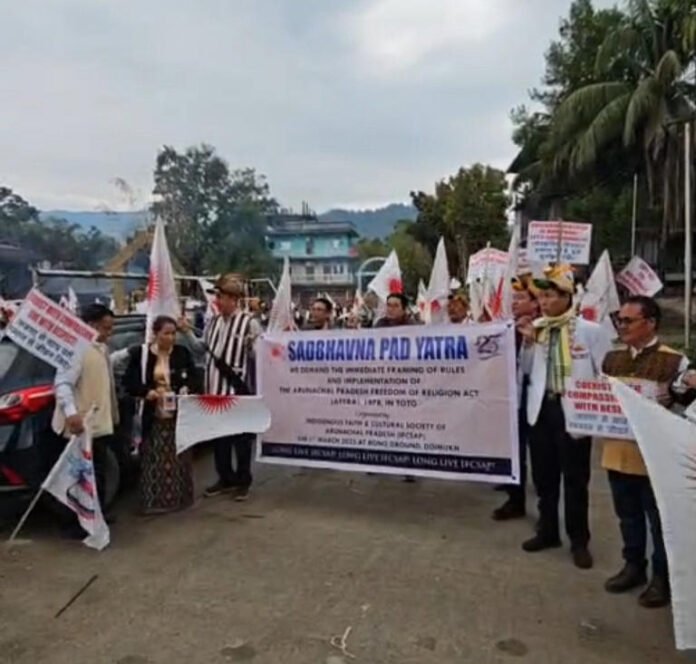Indigenous faith believers in Arunachal Pradesh recently organized a rally advocating for the enforcement of the Arunachal Pradesh Freedom of Religion Act (APFRA), 1978. The event underscored the community’s commitment to preserving their ancestral traditions and highlighted the ongoing debate surrounding religious conversions in the state.
Historical Context of the APFRA
Enacted in 1978, the APFRA was introduced to prohibit conversions from indigenous faiths to other religions through force, inducement, or fraudulent means. The Act defines “indigenous faith” to include religions, beliefs, and practices sanctioned and performed by the indigenous communities of Arunachal Pradesh, encompassing Buddhism as practiced among the Monpas, Membas, Sherdukpens, Khambas, Khamptis, and Singphos, as well as Vaishnavism among the Noctes and Akas. Despite its passage, the Act remained largely unenforced for decades, leading to concerns about the erosion of traditional beliefs.
Recent Developments and Government Stance
The movement to implement the APFRA gained momentum following a directive from the Gauhati High Court in 2022, which urged the state government to finalize the rules for its enforcement. Responding to this, Chief Minister Pema Khandu announced in December 2024 that the government would proceed with implementing the Act. He emphasized that a structured Freedom of Religion Act would play a crucial role in protecting Arunachal’s indigenous faith and culture.
The Indigenous Faith and Cultural Society’s Advocacy
The Indigenous Faith and Cultural Society of Arunachal Pradesh (IFCSAP) has been at the forefront of advocating for the Act’s implementation. Celebrating its silver jubilee in December 2024, the IFCSAP reiterated the importance of the APFRA as a safeguard for all religions in the state. The organization believes that enforcing the Act will protect indigenous communities from unethical conversion practices and ensure the preservation of their cultural heritage.
Opposition from Christian Organizations
Conversely, Christian groups, notably the Arunachal Christian Forum (ACF), have expressed strong opposition to the Act’s enforcement. They argue that the APFRA could infringe upon individuals’ rights to freely practice and propagate their religion. In February 2025, the ACF organized a hunger strike protesting the Act, warning that its implementation could have grave consequences and potentially divide society along religious lines.
The Rally: A Display of Cultural Unity
Amidst this backdrop, the recent rally by indigenous faith believers served as a powerful testament to their dedication to preserving their religious identity. Participants from various tribes and communities gathered, showcasing traditional attire, music, and dance, symbolizing the rich cultural tapestry of Arunachal Pradesh. Speakers at the rally emphasized the need for legal measures like the APFRA to protect their traditions from external influences and ensure that future generations can continue to practice their ancestral faiths.
Legal and Ethical Considerations
The debate over the APFRA touches upon fundamental issues of religious freedom and cultural preservation. While the Act aims to prevent coercive conversions and protect indigenous cultures, critics argue that it could be misused to suppress legitimate religious activities. The challenge lies in balancing the protection of vulnerable communities from unethical practices while upholding the constitutional rights of individuals to choose and change their religion.
The Path Forward
As the state government moves towards implementing the APFRA, it faces the delicate task of addressing the concerns of both proponents and opponents. Engaging in open dialogues with all stakeholders, including indigenous groups, religious minorities, and civil society organizations, will be crucial. Establishing clear guidelines and safeguards within the Act can help prevent potential misuse and ensure that it serves its intended purpose of protecting cultural heritage without infringing on individual freedoms.
The rally by indigenous faith believers in support of the APFRA highlights the deep-seated desire among many in Arunachal Pradesh to preserve their cultural and religious identity. As the state navigates the complexities of implementing the Act, it must strive to foster an environment where diverse beliefs can coexist harmoniously, ensuring that the rights of all communities are respected and protected.

